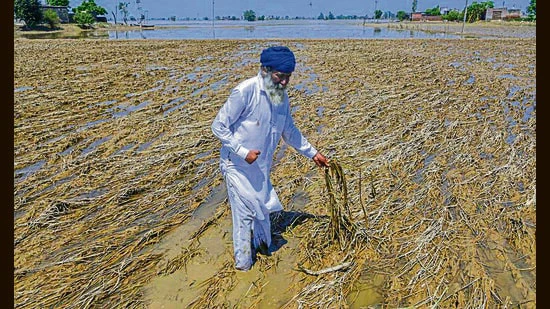In a major setback to Punjab’s premium aromatic basmati grain farmers, floods triggered by the release of excess water from the three dams – Bhakra, Beas, and Ranjit Sagar Dam- have damaged at least 1.20 lakh acres of aromatic basmati crop in the districts of Pathankot, Gurdaspur, and Amritsar.
Floods have affected crops over 4.72 lakh acres in the state.
The losses, according to experts and industry insiders, could easily exceed ₹1,000 crore, with no chances of crop recovery.
“The loss to export price of the grain may be much higher,” said Ashok Sethi, director of the basmati exporters association.
The affected basmati crop was in its final stage of growth, a critical time when grains form and the crop nears harvesting. However, the floodwaters, rising up to 10 to 15 feet in some parts, remained stagnant for several days, completely submerging the fields and destroying the mature plants.
Ironically, the area worst hit is also the most fertile and prized zone globally for basmati cultivation, between the Ravi and Beas rivers. Nearly 40% of Punjab’s basmati crop is sown in this belt, spanning 2.70 lakh hectares (roughly 6.67 lakh acres). The very rivers that make the region ideal for basmati farming became the reason for its devastation this season.
Overall, the basmati crop was sown over 6.81 lakh hectares (16.70 lakh acres) in Punjab. With nearly 10% of the total area now destroyed, farmers are staring at huge financial losses. On average, farmers are estimating a per-acre loss of around ₹70,000, given that the crop was fetching up to ₹3,500 per quintal in unaffected areas such as Verka and Patti blocks.
Sethi said that the damage is unprecedented. “This year’s losses due to the floods can be easily pegged at ₹1,000 crore and may go even higher, considering the export value of the basmati crop,” he said.
“We are requesting the government to provide adequate compensation, more than what has traditionally been offered, keeping in mind the cost attached with the premium crop and the losses incurred,” suggested Sethi.
For many farmers, the situation is grim. Surjan Singh, a farmer from the Ajnala area of Amritsar, said his entire 15-acre basmati crop was destroyed in the floods. “This is the worst I have witnessed in decades. I had taken loans to cultivate basmati, hoping for good returns, but everything is gone. I do not know how I will repay my debts,” he said in a choking voice.
Experts warn that the huge crop loss could also impact India’s basmati exports, as Punjab contributes significantly to the national export basket. Total basmati exports from the country were worth ₹40,000 crore last year (CHECK), and Punjab contributes nearly 40% of the total exports.
Arrival begins in Patti, Verka blocks
The crop loss comes at a time when basmati from unaffected areas has just started arriving in mandis and is fetching a favourable price of ₹3,500 per quintal, highlighting the high quality and demand for the produce. “It is an encouraging trend. We were apprehensive that the premium grain prices may crash due to floods, damages to the crop, and short supply,” Sethi said.
